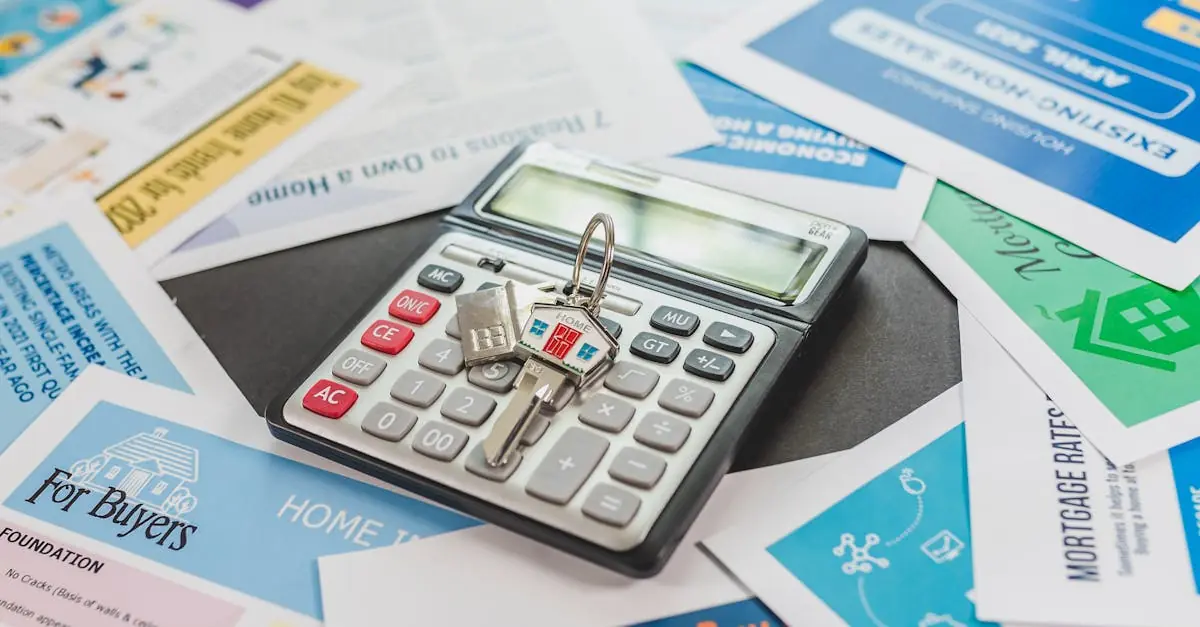Table of Contents
ToggleNavigating the world of homeownership can feel like trying to solve a Rubik’s Cube blindfolded, especially when it comes to budgeting with a VA mortgage. But fear not! With a little guidance, managing your finances can be as straightforward as pie—just without the calories. VA loans offer incredible benefits for veterans and active-duty service members, but understanding how to budget effectively can make all the difference in turning that dream home into a reality.
Understanding VA Mortgages
VA mortgages offer unique advantages for veterans and active-duty service members. These loans, backed by the Department of Veterans Affairs, simplify the home-buying process.
What Is a VA Mortgage?
A VA mortgage is a home loan designed specifically for eligible veterans and service members. No down payment is typically required, making homeownership more accessible. These loans feature competitive interest rates, which are often lower than conventional mortgage options. Additionally, they do not require private mortgage insurance, resulting in long-term savings for borrowers.
Benefits of VA Mortgages
Several benefits accompany VA mortgages, making them attractive to those who qualify. The absence of down payment requirements allows homebuyers to retain savings for other expenses. Lower interest rates contribute to manageable monthly payments, enhancing affordability. No private mortgage insurance means more cash flow in the budget. Furthermore, VA loans offer flexible credit score requirements, accommodating a wider range of financial situations.
Setting Up Your Budget
Setting up a budget is crucial for successful homeownership with a VA mortgage. Understanding personal finances significantly impacts financial planning.
Assessing Your Finances
Analyzing income plays a critical role in any budget. He or she should gather monthly income sources, including salary, bonuses, and any side jobs. Expenses, including utilities, groceries, and personal spending, must also be listed. Tracking discretionary and essential expenses ensures a complete picture. Setting aside emergency funds helps manage unforeseen costs. Lastly, knowing debt obligations, such as credit cards and loans, prepares for potential financial strain during homeownership.
Determining Your Mortgage Affordability
Calculating mortgage affordability starts with understanding overall financial health. He or she needs to consider the VA loan’s benefits, such as no down payment and competitive interest rates. Total monthly expenses should not exceed 28% of gross monthly income. This includes housing costs and other financial commitments. Accounting for property taxes, homeowners insurance, and potential HOA fees provides a clearer view. Using a mortgage calculator aids in determining specific loan amounts based on desired monthly payments. Knowing these factors lays the groundwork for confident decisions in homeownership planning.
Creating a Budget for VA Mortgage
Creating a budget for a VA mortgage requires a clear understanding of various expenses involved in homeownership. This section addresses the types of costs that impact financial planning effectively.
Fixed vs. Variable Expenses
Fixed expenses remain constant each month and typically include mortgage payments, property taxes, and homeowners insurance. Variability comes into play with costs like utilities, maintenance, and groceries. Keeping track of fixed expenses helps establish a reliable baseline for monthly budgeting. Adjusting for variable expenses can assist in managing funds more effectively throughout the month. It’s essential to differentiate between these types of expenses since knowing which ones fluctuate can aid in making informed financial decisions. Establishing an accurate view of both fixed and variable costs allows for comprehensive budgeting, ensuring financial stability in homeownership.
Essential vs. Discretionary Spending
Essential spending encompasses necessary costs for daily living, such as groceries, transportation, and healthcare. These are basic needs that must be satisfied every month. Discretionary spending, however, includes non-essential expenses like dining out, entertainment, and luxury items. Understanding the difference between these two categories plays a significant role in effective budgeting. Prioritizing essential expenditures helps ensure that fundamental needs are met first. Cutting back on discretionary spending can create additional funds for savings, debt reduction, or unexpected expenses. Striking a balance allows homeowners to enjoy their lifestyle while maintaining financial responsibility.
Managing Your VA Mortgage Budget
Managing a budget for a VA mortgage requires strategic planning and careful monitoring of expenses. Homeowners must focus on both fixed and variable costs to maintain financial stability.
Tips for Staying on Track
Establishing a monthly budget helps keep spending in check. He or she can review expenses weekly to identify trends and make adjustments as needed. Separating discretionary and essential spending promotes better decision-making. Prioritizing essential costs like mortgage payments and property taxes ensures that critical obligations are met first. Setting specific savings goals for emergencies contributes to long-term financial health. Tracking progress towards these goals instills a sense of accomplishment and accountability.
Tools and Resources for Budgeting
Various tools assist in effective budgeting for a VA mortgage. Budgeting apps like Mint or YNAB provide users with real-time tracking of income and expenses. Online calculators help estimate mortgage payments, taking into account interest rates and taxes. Resources like the VA’s official website offer valuable information on available benefits. Utilizing spreadsheets can also facilitate personalized budgeting methods tailored to individual needs. Engaging with local financial advisors ensures access to professional insights and guidance.
Conclusion
Budgeting with a VA mortgage is a vital step toward achieving homeownership. By understanding personal finances and implementing strategic planning, individuals can navigate the complexities of budgeting effectively. Utilizing tools like budgeting apps and mortgage calculators can simplify the process and help maintain financial stability.
Setting specific savings goals and regularly reviewing expenses ensures readiness for any unexpected costs. With the unique benefits that VA loans offer, veterans and active-duty service members have the opportunity to make homeownership a reality. By prioritizing essential expenses and planning for the future, they can enjoy the rewards of their investment while maintaining a healthy financial outlook.







